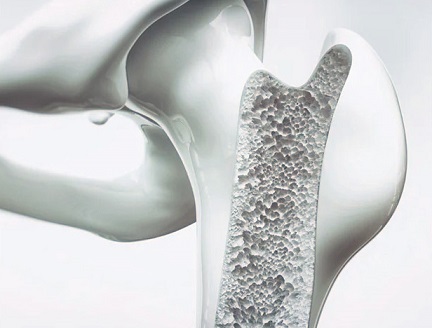Nikhil Prasad Fact checked by:Thailand Medical News Team Nov 07, 2024 1 year, 1 month, 1 week, 4 days, 15 hours, 29 minutes ago
Medical News: COVID-19 has left a wide trail of health complications beyond the lungs. Among its lesser-known effects is the risk of increased bone fragility, particularly among elderly patients. Researchers from the Università degli Studi di Milano, IRCCS Istituto Ortopedico Galeazzi, and IRCCS Istituto Auxologico Italiano in Italy have explored the link between COVID-19 and bone health, focusing on how the virus affects bone turnover and fragility. This
Medical News report dives into the findings, showing how COVID-19 raises the risk of fragile bones through the lens of osteoimmunology - where immune and skeletal systems intersect.
 COVID 19 Weakens Bones in the Elderly, Increasing Risk of Fractures
The Study Setup: Tracking Bone Health in COVID-19 Patients
COVID 19 Weakens Bones in the Elderly, Increasing Risk of Fractures
The Study Setup: Tracking Bone Health in COVID-19 Patients
To assess COVID-19’s impact on bone strength, researchers observed elderly patients undergoing orthopedic surgery between April 2021 and April 2023. The study grouped patients into COVID-positive and COVID-negative, examining specific biomarkers linked to bone health and inflammation. Using serum samples collected before and after surgery, the study aimed to track bone turnover markers over time.
By analyzing osteoimmunological biomarkers, such as the RANKL/OPG ratio, this study shows how inflammation driven by COVID-19 could accelerate bone loss. These indicators are known for their role in managing bone remodeling, where RANKL prompts bone resorption (or breakdown) while OPG works to protect bone by suppressing RANKL activity.
Key Findings: The Role of RANKL, OPG, and Bone Fragility Indicators
-Higher Bone Loss in COVID-19 Patients: COVID-19-positive patients displayed an elevated RANKL/OPG ratio compared to their COVID-negative counterparts, especially in the early post-surgery period. This ratio, indicative of bone resorption, highlights COVID-19’s potential to weaken bones by accelerating breakdown processes.
-Elevated FGF23 Levels: Another key finding was a significant rise in fibroblast growth factor 23 (FGF23) among COVID-positive individuals, a marker closely tied to bone fragility. Elevated FGF23 levels suggest weakened bone structures, making bones more susceptible to fractures. This was confirmed by robust ROC (receiver operating characteristic) values, underscoring FGF23’s diagnostic strength in identifying COVID-19-related bone weakness.
Probing the Inflammatory Link: Markers Beyond Bone Health
While standard inflammation markers like white blood cells (WBC) and C-reactive protein (CRP) showed little difference, researchers observed heightened levels of interleukin-6 (IL-6) and soluble receptor for advanced glycation end-products (sRAGE) in COVID-positive patients. IL-6, a cytokine often linked to inflammatory diseases, presented at significantly higher levels in COVID-positive patients, reflecting an active inflammatory response. sRAGE, a recognized indicator of inflammation severity, also displayed heightened levels in COVID-positive patients, showi
ng promise as a biomarker for COVID-19 severity.
The RANKL/OPG, IL-6, and sRAGE Connection
The study’s findings suggest a strong association between the RANKL/OPG ratio and inflammatory markers IL-6 and sRAGE. In COVID-19 patients, the higher RANKL/OPG ratio aligned closely with IL-6 and sRAGE levels, further linking inflammation with accelerated bone loss. By tracking these indicators, the researchers show how osteoimmunology could provide a reliable means of assessing bone health risks tied to COVID-19.
Inflammation’s Role in Bone Weakness: The Mechanics of Fragility
COVID-19 infection drives up inflammatory responses in the body, setting off a cascade that affects bone cells. The RANKL/OPG imbalance indicates a greater tendency for bone to break down, fueled by inflammation-induced changes. In cases of severe COVID-19, this inflammatory cycle may become amplified, further increasing bone fragility in patients already vulnerable due to age or pre-existing bone conditions.
IL-6, a pivotal player in inflammation, appears to contribute to this cycle by promoting cytokine release and subsequent bone loss. The study notes that IL-6 levels were highest in COVID-positive patients, supporting the idea that COVID-19’s inflammatory response might be one of the main drivers behind observed increases in bone fragility.
Insights into COVID-19’s Impact on the Elderly
The elderly, who often face greater risks of inflammation due to aging, or “inflammaging,” may be especially susceptible to COVID-19-related bone fragility. Inflammaging can make the elderly more vulnerable to infections, including COVID-19, exacerbating bone loss and weakening skeletal structure. As the population ages, the need to understand these effects on the elderly becomes essential, especially given their heightened risk for fractures and longer recovery times.
Conclusions: Addressing Bone Health Risks Post-COVID-19
The study’s conclusions indicate that osteoimmunological biomarkers like the RANKL/OPG ratio could offer a practical solution for tracking bone health in COVID-19 patients, particularly the elderly. These markers provide essential insights into how inflammation affects bone structure, pointing to a way of better predicting and managing bone fragility in vulnerable populations. With COVID-19 likely to continue impacting bone health in older adults, routine assessments of bone fragility could become vital for post-COVID care.
Elderly COVID-19 survivors are at heightened risk of fractures, which can drastically reduce quality of life. Preventive measures such as regular bone density scans, calcium, and vitamin D supplements, and gentle physical activity may help reduce these risks. This study underscores the importance of tailored interventions for bone health, particularly as long COVID symptoms, like chronic inflammation, could further increase bone-related risks.
The study findings were published in the peer-reviewed journal: Frontiers in Immunology.
https://www.frontiersin.org/journals/immunology/articles/10.3389/fimmu.2024.1493643/full
For the latest COVID-19 News, keep on logging to Thailand
Medical News.
Read Also:
https://www.thailandmedical.news/news/covid-19-news-sars-cov-2-infections-can-lead-to-bone-loss
https://www.thailandmedical.news/news/covid-19-news-slovakian-study-shows-that-covid-19-pandemic-has-affected-the-bone-density-of-young-adults-possibly-due-to-lifestyle-changes
https://www.thailandmedical.news/news/breaking-sars-cov-2-targets-endothelin-receptors,-causing-bone-and-cartilage-damage-and-joint-pains-endothelin-receptor-blocker-macitentan-helps
https://www.thailandmedical.news/news/breaking-evidence-found-that-sars-cov-2-even-delves-into-the-skull-bones-of-those-infected
https://www.thailandmedical.news/news/brazilian-study-validates-that-covid-19-infections-also-affects-the-musculoskeletal-system
